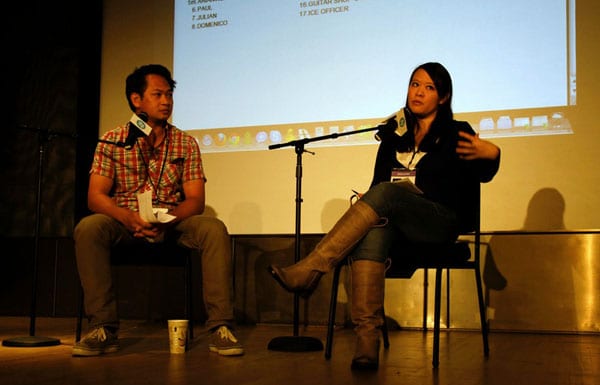Better Film Panels Now
by Mynette Louie on May 16, 2013 in Festival Strategy
In the year and a half since Brian Newman wrote his very apt and memorable post, “Killing the Film Fest Panel,” panels haven’t improved much. In that time, I’ve spoken on or moderated over a dozen panels, and it seems that panel organizers haven’t really taken Brian’s suggestions to heart. The majority of film panels remain as excruciatingly boring and useless as ever.
So, let’s try a different tack: I propose that we panelists and moderators step up our game and give the (sometimes paying) audiences a better panel. Here’s how:
1. Be succint. This is the golden rule of panel-speaking. Way too often, I feel like I’m being held hostage by a long-winded moderator or panelist. I see the eyelids of audience members flitting with sleep as the Run-D.M.C. lyrics, “You talk too much, you never shut up,” loop in my head. Speakers (and everyone else for that matter) should learn how to say more with less words. Time on panels and time in life is limited, so please stop wasting it.
2. Stay on topic. It’s OK to go off on a tangent once in a while if it’s relevant and instructive, but people came to hear you based on the topic that was advertised. So do your best to keep reminding yourself what your panel is about, and what key questions the audience expects you to answer.
3. Know your audience. Tailor what you say to who’s in the audience–directors vs. producers vs. press vs. laypeople, etc.–and the level of their film knowledge. I always like to poll the audience at the start of each panel to find out who’s in it. Also, ask the panel organizer or festival programmer about the audience composition.
4. Be specific & universal at the same time. Your expertise is based primarily on your own particular experiences, so it’s good to offer specific anecdotes, but only if they can be applied broadly. Don’t be an obvious shill for your specific agenda and interests–always frame them in terms of how the audience might apply them to their own experiences. However, be careful not to go to the other extreme and start speaking in vague platitudes. It’s alarming how many mantra-like tweets emerge from panels–it’s just a stupid panel, not an evangelical mass. And remember: nobody knows anything anyway.
5. Be conversational. Don’t talk at people, talk with people. The most interesting panels are interactive. I love engaging in genuine conversations with my co-panelists or audience members. To me, dialogues are almost always more compelling and instructive than monologues.
6. Be flexible & organic. This relates to the preceding point. If you are too stubborn about making certain points, or too rigid in your delivery, people will get bored. Like in a film production, you must allow for “happy accidents,” so listen to what your co-panelists are saying and react to them.
7. Be honest & real. Audiences aren’t stupid; they can tell when you’re being phony. Also, share as much insider info and data as you can without violating your confidentiality clauses or threatening your own livelihood.
8. Don’t be boring. You are on a stage with a mic in front of a captive audience. Say something provocative or crack a joke every now and then!
9. Moderators: Don’t be afraid to cut people off. This one is just for the moderators. Don’t be afraid of reminding panelists how much time they have left or cutting them off and bringing them back down to earth. You guys are the “ADs” of panels. It’s your job to keep things moving and on track!
10. Audiences: Don’t pitch your own projects in the Q&A. OK, this one’s a postscript, but I gotta say it because this is such a common problem. I’m sure your project is very interesting, but no one came to that panel to hear about it. So please keep it to yourself, and just ask your question–which will be broadly applicable and succinct, of course!

